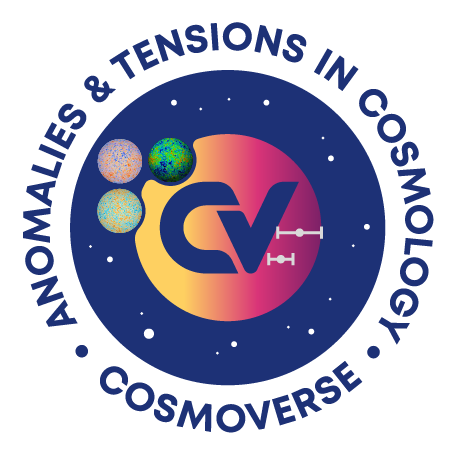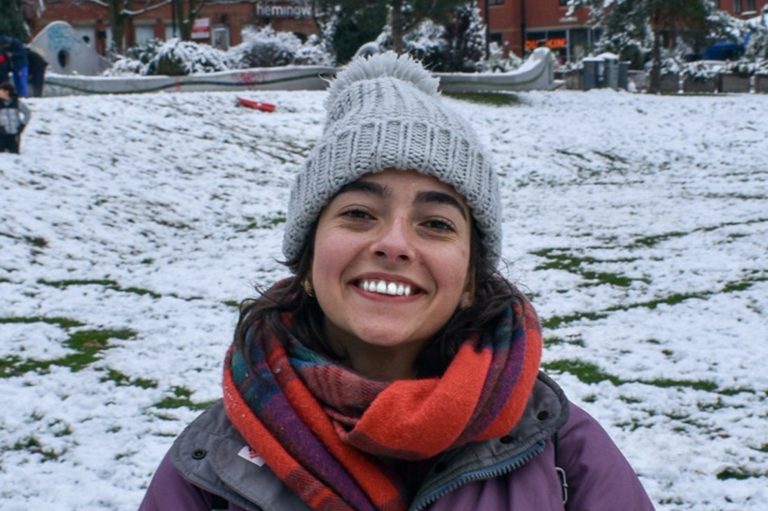What is your name, affiliation, academic position, and job title?
My name is Elsa Teixeira, I am currently finishing my PhD at the School of Mathematics and Statistics, at the University of Sheffield.
What is your journey?
I’m originally from Lisbon, where I did my undergraduate in Theoretical Physics and my Masters degree specialised in Astrophysics and Cosmology, both at the University of Lisbon (FCUL). During my MSc I was affiliated with the Portuguese Institute of Astrophysics and Space Sciences (IA), where I remained for one additional year with a research scholarship. I then moved to Sheffield to start my PhD in 2019 and I am now about to move to Montpellier as a postdoctoral researcher at CNRS, based at the Laboratoire Univers et Particules de Montpellier (LUPM).
What is your field of research and/or what project are you involved in?
In just a few words, my field of research is mainly about understanding the nature of the dark sector of the Universe, that is the dark matter and dark energy that are needed in the standard model of cosmology but which still lack direct detection and a fundamental description. I am a theorist, in the sense that I don’t work directly on experiments, but I work on interpreting and analysing processed data. I also work for Euclid, a satellite from the European Space Agency, which was just launched and will probe the dark sector.
What are your research plans?
My research interests are very broad, although I want to keep investigating the nature of the dark sector, I would also like to further explore other topics such as gravitational wave physics and additional signatures of the so-called spectral distortions in the Cosmic Microwave Background (CMB), which will give us new insight on the primordial Universe.
How does CosmoVerse fit within those plans?
The CosmoVerse COST Action bring together researchers with different expertise and working on different sides of the cosmic tensions. The collaborative network created by CosmoVerse is an exciting arena for fruitful interactions and exchange of ideas and approaches to research.
Which of your skills are you most proud of, or find most useful?
Being someone who is fascinated by theoretical and philosophical subjects I would say that I am most proud of learning how to code and pushing myself to develop my own numerical tools and to investigate new ways to handle and optimise large sets of data. This is a very useful skill as it’s transversal to a variety of sectors beyond science and technology.
What new skills would you like to learn in the next year?
Time management and organisation as I have many different interests and can get distracted very quickly!
What are the most exciting open questions in your research area?
On the fundamental side I would say identifying the nature of dark matter and dark energy. Even though this may be a highly biased opinion, I think that it is somewhat unsettling that these species make up most of the matter content of the Universe while we have not yet directly detected them and lack a fundamental description of their nature. On the more technical side, I believe the most exciting questions are the ones the CosmoVerse Action focuses on across all Working Groups, namely, unveiling the origin of the cosmic tensions and testing the standard model of cosmology.
What advances or new results are you excited about or looking forward to?
I am really excited about the upcoming astrophysical and cosmological data releases expected by current and future experiments , particularly from Euclid, which I work directly on. These will broaden our understanding of the Universe with unprecedented high precision data, possibly unveiling some of the Universe’s “darkest” secrets. The next decade will be crucial for testing the robustness of the standard model and planning and developing the next-generation surveys, launching a new golden age for cosmology. There’s definitely exciting things to come!
What is your view on cosmic tensions? How does your work connect with this open question in the community?
The cosmic tensions in the data are a huge stepping stone in the future of cosmology, and I believe that the persistence of the disagreement between early- and late-Universe probes hints at cracks in the standard model. In that case, alternative paradigms are needed to reconcile the theoretical physical description with the evidence stemming from the observational data. Addressing these discordances is a community-wide endeavour and upcoming CMB and large-scale missions will deliver highly accurate data, offering unprecedented levels for large-scale testing of gravity. Working on the frontier between theory and data analysis can offer insight into what the data is trying to tell us.
What role do you think a community network like CosmoVerse can play in developing theoretical astroparticle physics and cosmology?
I believe that the main advantage of having a network like CosmoVerse is the feeling of community, working towards a common goal with frequent communication and opportunities to establish new collaboration both within and between Working Groups in different European universities. The ultimate goal of the CosmoVerse Action is to investigate the origin of the current cosmological tensions, linking ideas and skills from observational cosmology, data science and fundamental physics. I believe that this joint and complementary investigation is highly fruitful in unravelling the physical signatures concealed in the observational data.
What do you like and dislike about being a scientist?
I like the sense of community and the excitement of working in the frontier of knowledge where you have to be creative and inventive. I dislike the lack of opportunities for scientific research and the constant struggle for securing funding for research projects. In most cases job security is not guaranteed and a life in academia requires moving a lot around the world and being open to compromising other aspects of your life.
What’s your favourite food? Why?
All kinds of fruit! They’re colourful, delicious and contain all the goodies our brains and bodies need.
Your favourite scientist and/or science fiction film?
I really like Interstellar by Christopher Nolan.
How do you relax after a hard day of work?
Cooking and baking, being with friends, moving and just learning new things.
What non-physics interests do you have and want to share?
I really like writing and outreach, mostly with children. I find it really challenging to try to simplify intricate scientific concepts, using examples and metaphors for the things beyond our grasp, like the scales in the Universe.
If you were not a scientist, what do you think you would be doing?
Either something related with the climate crisis and how to tackle it, something related with writing or with education.
What do you hope to see accomplished scientifically in the next 50 years?
A better understanding of the mysteries behind this 95% share the content of the Universe that is enclosed in the occult dark sector.
In your view, what’s the most important challenge that humanity faces currently?
Definitely sustainability and the climate crisis, which is something we should all be putting our efforts into and working together. This will be a very democratic problem, as it will affect anyone independently of the social status, financial situation, job, country, gender, race, you name it. The scientific evidence shows that we are too close to the boundary of no return, and it’s still in our hands to provide a safe place to live and thrive for all the species and generations to come.
What question would you have liked us to ask you, and what would you have answered?
Q: Will we ever answer all the cosmic mysteries and find the “true nature” of the Universe?
A: Absolutely not, and that is the mystical and fascinating bit: there will always be more to unveil and we don’t have to understand everything, just keep seeking for whatever keeps our curiosity awake.

